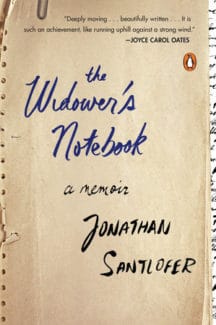Making sense of a broken world
Author: Jonathan Santlofer
 None of us gets through life unscathed.
None of us gets through life unscathed.
This is why I love reading memoirs. I want to know how people look suffering right in the face and then figure out a way to survive their hardships. To watch a man or woman unearth a nugget of courage and piece together a reliable support system is endlessly inspiring. “Could I do that?” I ask myself. “How would I get by if that were me?”
Case in point: if my husband died on our living room couch while I watched paramedics try (and fail) to resuscitate him, I don’t know how I would navigate my immediate sorrow, let alone the months and years stretching before me. How would I avoid becoming unhinged?
In The Widower’s Notebook, artist and author Jonathan Santlofer recounts this very situation. His wife, Joy, who is recuperating at home following outpatient knee surgery, starts feeling congested and feverish. It’s an August afternoon in their beautiful loft in New York City, and suddenly Joy is gasping for breath, her eyes wide with terror. After he calls 911 and the ambulance arrives, Santlofer recounts in searing detail the scene that unfolds before him: “Someone has tugged me away, my heart beating wildly, head light as if filled with helium, and I watch, a helpless man observing from the sidelines.”
Joy’s unexpected death leaves Santlofer bereft, nearly unable to function. For many months, he cannot eat, sleep or communicate the full extent of his anguish. But—again, this is why I love memoir—he manages to drag himself from the fog of his sleeping pills and put one foot in front of the other. He learns to seek comfort in his grown daughter, in close friends, in art. He starts to draw and write again, a painstaking and critical process that becomes the remarkable launch pad for The Widower’s Notebook.
Santlofer is mindful about making something out of his sadness. He says he wants to “pause, catch my breath, and look.” Among his discoveries, he finds that he’s clueless about mourning, he’s ill-prepared for post-marital sex, and men are expected to grieve differently than women. (Each of these topics affords rich discussion material for any book group.)
At first glance, Santlofer’s book seems so slim and unassuming, but let me set the record straight: it is raw, accessible, honest and brave. As he lays bare his rage and heartache, he doesn’t just save himself: he creates a narrative that begs to be read in a single sitting.
In The Widower’s Notebook, Santlofer ultimately wonders, “So how does one get past such a loss, the echoing silence—no planning, no resolutions, no arguments, no promises, no talking about dreams for the future? How is one supposed to accept that what has happened is true and irrevocable?” He stumbles his way into some meaningful answers, while generously sharing the fruits of his labor with us very fortunate readers.
[AMAZONPRODUCTS asin=”0143132490″]
- Northwoods Author Amy Pease Interview and Book Recommendations - April 29, 2024
- Still True author Maggie Ginsberg:Interview and Book Recommendations - September 14, 2022
- When wood and words come together:A children’s picture book is born - June 30, 2022

